![]()
![]()
![]()
Use LEFT and RIGHT arrow keys to navigate between flashcards;
Use UP and DOWN arrow keys to flip the card;
H to show hint;
A reads text to speech;
81 Cards in this Set
- Front
- Back
- 3rd side (hint)
|
Articles of Confederation |
plan for national government ratified in 1781 |

|
|
|
ratification |
act of offical confirmation |
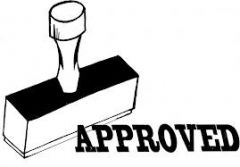
|
|
|
levy
|
impose or raise a tax |

|
|
|
Founders (or Framers)
|
people who helped create the U.S consitution |
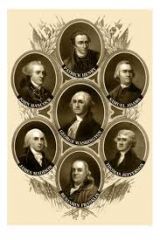
|
|
|
Virginia Plan
|
proposal for a two-house legislature with representation according to eah state's population or wealth. |
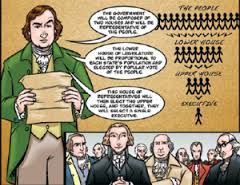
|
|
|
New Jersey Plan
|
proposal for legislature in which each state would have one vote. |

|
|
|
Great Compromise |
agreement to establish a two house ational legislature, with all states having equal representation in one house and each state having representation based on its population in the other house |
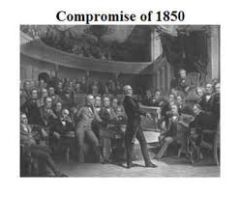
|
|
|
Three-Fifths Compromise |
agreement that three-fifths of a state's slave population would be counted fir representation and taxation. |

|
|
|
Executive Branch
|
government department that enforces laws |
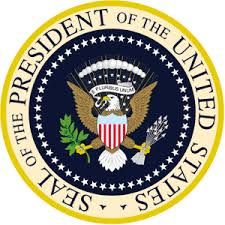
|
|
|
Judicial Branch
|
government department that interprets laws |
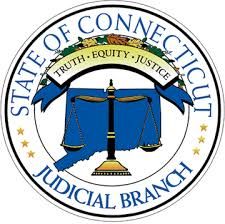
|
|
|
Legislative Branch
|
government department that makes laws |
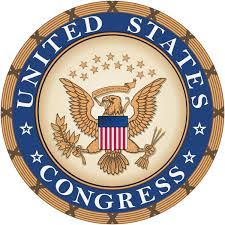
|
|
|
Checks & Balances
|
the ability of each branch of government to exercise checks, or controls, over the other branches |

|
|
|
Antifederalists
|
people who opposed ratification of the Consitution |

|
|
|
Federalists
|
people who supported radification of the Consitution
|
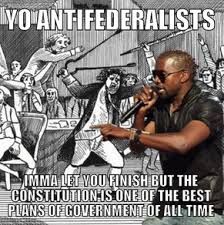
|
|
|
Federalism
|
system of government in which power is shared between the national ( or federal) government and the states |
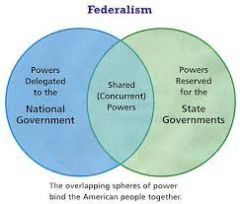
|
|
|
majority rule
|
system of government in which power more than half of a group holds the power to make descisions binding the entire group. |

|
|
|
amendment
|
addition to a document |

|
|
|
Bill of Rights
|
first ten amendments to the U.S. consitution |

|
|
|
House of Representatives
|
he lower house of the United States Congress. With 435 popularly elected officials, the House (as it is often called) is the most representative body in the federal government. House seats are apportioned (see apportionment) relative to each state's population. |

|
|
|
Senate
|
the smaller upper assembly in the US Congress |

|
|
|
Congress
|
the national legislative body of a country. |
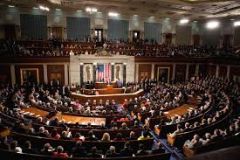
|
|
|
Popular Sovereignty |
a doctrine, held chiefly by the opponents of the abolitionists, that the people living in a territory should be free of federal interference in determining domestic policy, especially with respect to slavery. |

|
|
|
Republicanism |
government. |

|
|
|
separation of powers
|
the principle or system of vesting in separate branches the executive, legislative, and judicial powers of a government |

|
|
|
limited government
|
restricted with reference to governing powers by limitations prescribed in laws and in a constitution, as in limited monarchy
|

|
|
|
bicameralism |
having two branches, chambers, or houses, as a legislative body. |

|
|
|
judicial review |
principle that states that the supreme court has the final say in interpreting the constitution
|

|
|
|
impeachment
|
to formally accuse the president os misconduct in the office |
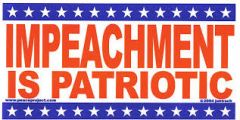
|
|
|
quorum
|
he number of members of a group or organization required to be present to transact business legally, usually a majority. |

|
|
|
revenue |
the income of a government from taxation, excise duties, customs, or other sources, appropriated to the payment of the public expenses.
|

|
|
|
veto
|
to prevent from becoming law |

|
|
|
naturalization |
to confer upon (an alien) the rights and privileges of a citizen. |

|
|
|
elastic clause |
a statement in the U.S. Constitution (Article I, Section 8) granting Congress the power to pass all laws necessary and proper for carrying out the enumerated list of powers. |

|
|
|
natural born citizen
|
a citizen born in the U.S.
|

|
|
|
electoral college |
a body of electors chosen by the voters in each state to elect the president and vice president of the U.S. |
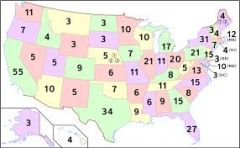
|
|
|
Supreme Court
|
the highest court of the U.S.
|
|
|
|
suffrage
|
the right to vote, especially in a political electio
|
|
|
|
due process of law
|
the regular administration of the law, according to which no citizen may be denied his or her legal rights and all laws must conform to fundamental, accepted legal principles, as the right of the accused to confront his or her accusers.
|
|
|
|
bail |
to grant or obtain the liberty of (a person under arrest) on security given for his or her appearance when required, as in court for trial. |
|
|
|
Constitution |
the system of fundamental principles according to which a nation, state, corporation, or the like, is governed.
|
|
|
|
Vocab Word
|
Definition
|
|
|
|
Articles of Confederation
|
plan for national government ratified in 1781
|
|
|
|
ratification
|
act of offical confirmation
|
Directions: IN YOUR OWN WORDS, type the definition for each Constitution vocab word/words. Once you have all of the definitions filled in, you will need to go to cram.com and turn them into flashcards complete with pictures. Watch the cram.com instruction video on the class website. You will find instructions under tab #6 Creating the Constitution. Look for "Constitution Vocab to know."
|
|
|
levy
|
impose or raise a tax
|
|
|
|
Founders (or Framers)
|
people who helped create the U.S consitution |
|
|
|
Virginia Plan
|
proposal for a two-house legislature with representation according to eah state's population or wealth. |
|
|
|
New Jersey Plan
|
proposal for legislature in which each state would have one vote.
|
|
|
|
Great Compromise
|
agreement to establish a two house ational legislature, with all states having equal representation in one house and each state having representation based on its population in the other house
|
|
|
|
Three-Fifths Compromise
|
agreement that three-fifths of a state's slave population would be counted fir representation and taxation.
|
|
|
|
Executive Branch
|
government department that enforces laws
|
|
|
|
Judicial Branch
|
government department that interprets laws
|
|
|
|
Legislative Branch
|
government department that makes laws
|
|
|
|
Checks & Balances
|
the ability of each branch of government to exercise checks, or controls, over the other branches
|
|
|
|
Antifederalists
|
people who opposed ratification of the Consitution
|
|
|
|
Federalists
|
people who supported radification of the Consitution
|
|
|
|
Federalism
|
system of government in which power is shared between the national ( or federal) government and the states
|
|
|
|
majority rule
|
system of government in which power more than half of a group holds the power to make descisions binding the entire group.
|
|
|
|
amendment
|
addition to a document
|
|
|
|
Bill of Rights
|
first ten amendments to the U.S. consitution
|
|
|
|
House of Representatives
|
he lower house of the United States Congress. With 435 popularly elected officials, the House (as it is often called) is the most representative body in the federal government. House seats are apportioned (see apportionment) relative to each state's population.
|
|
|
|
Senate
|
the smaller upper assembly in the US Congress
|
|
|
|
Congress
|
the national legislative body of a country.
|
|
|
|
Popular Sovereignty
|
a doctrine, held chiefly by the opponents of the abolitionists, that the people living in a territory should be free of federal interference in determining domestic policy, especially with respect to slavery.
|
|
|
|
Republicanism
|
government.
|
|
|
|
separation of powers
|
the principle or system of vesting in separate branches the executive, legislative, and judicial powers of a government
|
|
|
|
limited government
|
restricted with reference to governing powers by limitations prescribed in laws and in a constitution, as in limited monarchy
|
|
|
|
bicameralism
|
having two branches, chambers, or houses, as a legislative body.
|
|
|
|
judicial review
|
principle that states that the supreme court has the final say in interpreting the constitution
|
|
|
|
impeachment
|
to formally accuse the president os misconduct in the office
|
|
|
|
quorum
|
he number of members of a group or organization required to be present to transact business legally, usually a majority.
|
|
|
|
revenue
|
the income of a government from taxation, excise duties, customs, or other sources, appropriated to the payment of the public expenses.
|
|
|
|
veto
|
to prevent from becoming law
|
|
|
|
naturalization
|
to confer upon (an alien) the rights and privileges of a citizen.
|
|
|
|
elastic clause
|
a statement in the U.S. Constitution (Article I, Section 8) granting Congress the power to pass all laws necessary and proper for carrying out the enumerated list of powers.
|
|
|
|
natural born citizen
|
a citizen born in the U.S.
|
|
|
|
electoral college
|
a body of electors chosen by the voters in each state to elect the president and vice president of the U.S.
|
|
|
|
Supreme Court
|
the highest court of the U.S.
|
|
|
|
suffrage
|
the right to vote, especially in a political electio
|
|
|
|
due process of law
|
the regular administration of the law, according to which no citizen may be denied his or her legal rights and all laws must conform to fundamental, accepted legal principles, as the right of the accused to confront his or her accusers.
|
|
|
|
bail
|
to grant or obtain the liberty of (a person under arrest) on security given for his or her appearance when required, as in court for trial.
|
|
|
|
Constitution
|
the system of fundamental principles according to which a nation, state, corporation, or the like, is governed. |
|

